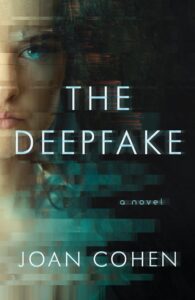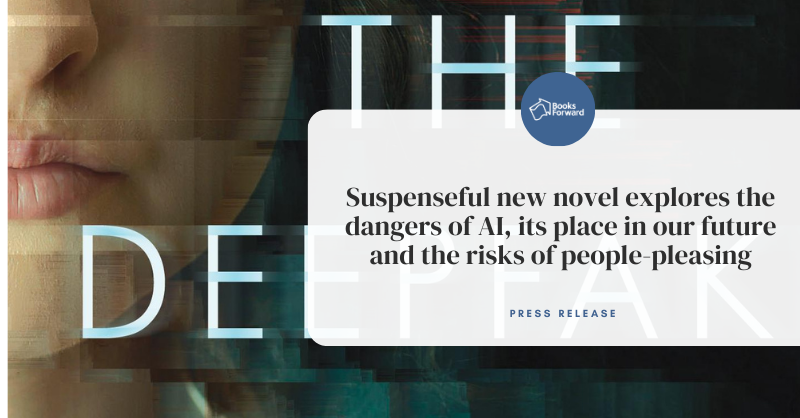 STOCKBRIDGE, Mass. – In her upcoming novel, “The Deepfake” (She Writes Press, April 2, 2024), lauded author Joan Cohen “succeeds in building tantalizing tension that keeps the pages turning,” according to BookLife. The book has also received high praise from Kirkus with a coveted starred review saying that “readers will easily relate to and root for a woman breaking free of the good-girl mold to find new and genuine purpose.”
STOCKBRIDGE, Mass. – In her upcoming novel, “The Deepfake” (She Writes Press, April 2, 2024), lauded author Joan Cohen “succeeds in building tantalizing tension that keeps the pages turning,” according to BookLife. The book has also received high praise from Kirkus with a coveted starred review saying that “readers will easily relate to and root for a woman breaking free of the good-girl mold to find new and genuine purpose.”
Sylvie considers herself a team player at her artificial intelligence (AI) company, but when she uncovers her colleagues’ illegal activities, pleasing everyone becomes impossible. Torn about what to do, she confides in her personal trainer, who’s dismayed not only by the choices she faces but also by her advocacy of AI, a technology he considers dangerous. Despite the barbs the two trade at the gym, they are drawn to each other. If only Sylvie weren’t continually summoned to the Miami estate of her mother and stepfather, where illness, death, a disputed will, and the rekindled ashes of an old flame swirl into a disaster that follows Sylvie back to Boston, bringing harm to her and those she cares about.
“The Deepfake”
Joan Cohen | April 2, 2024 | She Writes Press | Fiction
Paperback | ISBN: 978-1647426064 | $17.95
Ebook | ASIN: B0C9HKFW5C | $9.95
About the Author
 Originally from Mount Vernon, New York, Joan Cohen is the author of “The Deepfake” (She Writes Press, April 2, 2024). She received her BA from Cornell University and her MBA from New York University. Her career in sales and marketing at technology companies led to executive management, and after retirement she returned to school for an MFA in Writing from Vermont College of Fine Arts. She is the author of the novel “Land of Last Chances,” published in 2019. She now resides in Stockbridge, Massachusetts, in the Berkshires, with her husband and latest canine addition. Find out more about her at http://joancohenauthor.com/.
Originally from Mount Vernon, New York, Joan Cohen is the author of “The Deepfake” (She Writes Press, April 2, 2024). She received her BA from Cornell University and her MBA from New York University. Her career in sales and marketing at technology companies led to executive management, and after retirement she returned to school for an MFA in Writing from Vermont College of Fine Arts. She is the author of the novel “Land of Last Chances,” published in 2019. She now resides in Stockbridge, Massachusetts, in the Berkshires, with her husband and latest canine addition. Find out more about her at http://joancohenauthor.com/.
Follow Joan Cohen on social media:
Facebook: @JoanCohenAuthor
 Early Praise for “The Deepfake”
Early Praise for “The Deepfake”
“An indecisive woman finds inner strength—and romance—in this wise and witty tale.”
– Starred Kirkus Review
“Bold novel of AI, corporate scandal, and a woman’s self-discovery.”
– BookLife
In an interview, Joan Cohen can discuss:
- The ethical, legal, religious, philosophical, political and cultural issues impacted by AI.
- The benefits of AI in helping solve previously unsolvable problems.
- The relatable but unadvisable tendency to people-please and how it can hold women back professionally.
- The ways in which AI is already part of our lives, in ways we see and don’t see.
- The potential impact AI has on relationships, professional life, religion and political positions.
- The dangers of AI-created disinformation.
- The rapidly growing artificial intelligence market, expected to reach about $2.5 billion by 2032 and permeate every industry, e.g., banking, transportation, medicine.
- How books about AI have been primarily nonfiction or speculative fiction – “The Deepfake” is a fictional account of how AI can affect relationships, beliefs, and reality itself.
- ·How she thoughtfully and sensitively addresses sexual assault in her novel – There are over 20,000 books about rape listed on Amazon. A rape or other form of sexual assault happens every 68 seconds in the U.S. In “The Deepfake,” a rape leads to family conflict and dangerous consequences.
- How TV programs like “Succession,” news stories about the cryptocurrency scandals and the race to bring AI software to market have increased public interest in corporate malfeasance.
- Her debut novel, “Land of Last Chances,” a 2019 finalist for the National Indie Excellence Awards.
An Interview with
Joan Cohen
Sylvie is so relatable — trying to balance ethics, people-pleasing and being professionally successful in an industry dominated by men. How did you craft this character? Did you borrow from any of your life experiences or the life experiences of people you know?
Someone I once worked with told me I was “too nice to be successful in sales,” but one of the advantages of growing older is that you learn, as some of my characters do, how to take advantage of your strengths and minimize your weaknesses. Although I draw on the events of my life for background, my stories are in no way autobiographical, and characters are composites from my experience. As for ethics, I don’t think we typically think about them until we’re confronted with an important choice. In my opinion, rigid ethics and flexible ethics both create problems. That’s one of the reasons “Les Miserables” is such a fascinating story.
Why was it important for you to address the problem of people-pleasing in your novel?
I’ve known men who are people-pleasers, but very few. I think it’s a symptom of limited self-confidence, which seems to afflict women more than men. Why else would there be so many books for women on overcoming it? I’d like to think people-pleasing is a cultural artifact, and that girls are raised the same way as boys, but by adolescence, many girls change. Our culture tells girls they’re not okay the way they are, but need to improve their looks, clothes and demeanor, even in the workplace.
What got you interested in AI, and what role does it play in “The Deepfake?”
I spent my career working for technology companies, first as a programmer, and later in sales and marketing. Even though I didn’t stay with software development, my interest in the field stuck with me. My technical knowledge became obsolete quickly, and it certainly never included AI, but it’s the applicability of AI that fascinates me.
AI is becoming more and more prominent in our daily lives. What is the most surprising misunderstanding people may have about AI?
In my opinion, the most surprising misconception people have about AI is that we don’t have to worry about it yet.
Can you discuss the impact of AI? Specifically, can you discuss its benefits and its potential interference with our relationships, professional lives and political positions?
If we think we have a problem now with disinformation in politics, it’s going to get much worse. With people’s images and speech reproduced and manipulated, the audience for that fakery could become persuaded of anything. On social media, we already have trolling. Fake photos and online posts can damage personal and professional relationships. That assumes we still have professional relationships after all the job displacement AI will bring. Joblessness stresses marriages, and AI will stress parenting as well. Will there ever become a point when creativity becomes superfluous, when AI can be more creative than we are?
What kinds of AI-related discussions and debates do you think we will be having in the near future?
I think we’ll be debating regulating AI and slowing down its development vs. pushing forward with research and product creation. Even if we all agreed to slow it down, that wouldn’t mean other countries, including adversaries, would slow down too. We might lose our preeminent position in the field of AI. Our military could be at a disadvantage. As long as there is significant money to be made with AI products, I don’t believe AI’s development can be slowed, as intuitively appealing as that might be.
How and why should we protect ourselves against AI’s influence on our lives?
We can protect ourselves against disinformation and deepfakes by seeking alternate sources of information. I don’t know how we protect ourselves from AI in other forms because not everyone would agree we need protection. People make individual cost/benefit analyses even if they don’t call it that. Some will feel the risks are worth it and some won’t. An elderly, homebound person may love the robot that brings her food and medication. Another person may hate the self-driving car his neighbor uses because it parks in front of his house.
How does “The Deepfake” explore business ethics?
In “The Deepfake,” there are two characters who take the position that in business, you do what you have to do, right or wrong, to succeed. The two are the protagonist’s ex-husband and the head of development in her company. The highest priority is return on investment to the stockholders. On the other side is the protagonist’s boyfriend who argues that unethical behavior leads to the proverbial slippery slope.
What effect will AI have on religion? Have you already seen it impact religions? In what way?
One of my concerns is whose moral values AI reflects. Once you get past loving thy neighbor as thyself, different religions have different teachings. Does AI favor an eye for an eye or turn the other cheek? It’s humans who feed huge amounts of data to AI, which then draws conclusions, teaches itself, makes predictions, etc. If humans can’t agree on values, how will we program AI to make decisions about morality? Will there be different AI versions for the Catholics, Protestants, Jews, Muslims, etc.? I hope I don’t see people claiming to know what God would want.
Can you discuss the dangers of AI-created disinformation? What does it look like, how can we spot the dangers and avoid / prevent them?
Pursue information from multiple sources with different perspectives. I’d like to say trusted sources, but that, of course, may be difficult depending on the breadth of disinformation. The White House wants AI-produced information to be “watermarked” in some way, but will that be impervious to hacking? The dangers of AI-created disinformation include false political information, fake calls for violent action by supposedly respected individuals, slanderous posts, fake resumes for people taking sensitive positions (e.g., in the military), etc. Early deepfakes were inexpert and had recognizable flaws. Now, supposedly, anyone can acquire and use that software.
How does “The Deepfake” underscore the importance of embracing truth and staying true to your values?
I think the main characters in “The Deepfake” learn the importance of embracing truth and staying true to their values the same way most of us do: by making mistakes. Failure is painful, but it’s a great teacher.

A former award-winning journalist with national exposure, Marissa now oversees the day-to-day operation of the Books Forward author branding and book marketing firm, along with our indie publishing support sister company Books Fluent.
Born and bred in Louisiana, currently living in New Orleans, she has lived and developed a strong base for our company and authors in Chicago and Nashville. Her journalism work has appeared in USA Today, National Geographic and other major publications. She is now interviewed by media on best practices for book marketing.

